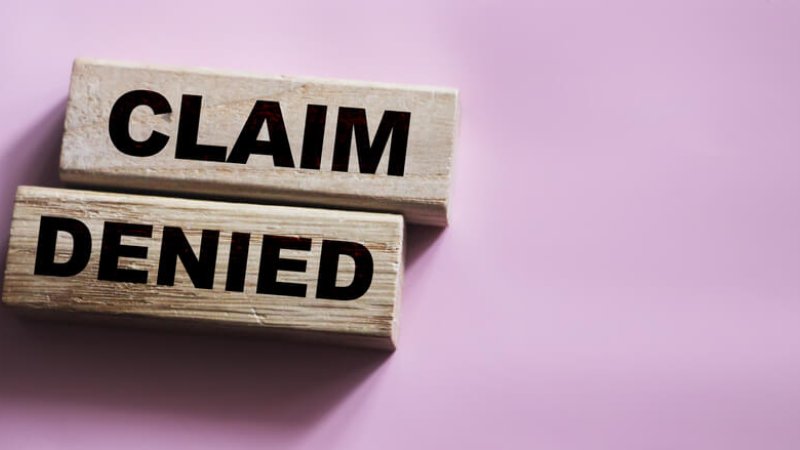Dealing with an accident is stressful enough on its own. A denial from the other driver’s insurance company can make it even more frustrating. If you’re in California and find yourself in this frustrating situation, there are steps you can take to resolve this situation. Here’s a guide that will help you understand what to do if the other driver’s insurance denied your claim, including the importance of working with an experienced car accident lawyer in Phoenix.
Reasons for Claim Denial

Insurance companies can deny claims for various reasons, which often fall into a few common categories: lack of evidence, policy exclusions, policy lapses, and failure to notify.
Lack of evidence is one of the most common reasons for a claim denial. To validate your claim, insurance companies will require you to provide substantial evidence of the other driver’s fault. This proof may include police reports, eyewitness statements, photos of the accident scene, and medical records.
Policy exclusions are also a common reason for claim denial. For example, if the policy excludes certain events, such as natural disasters, and the insurer believes the accident was caused by this type of event, they may deny your claim.
Policy lapses are generally the result of expired policies or policies that were terminated due to non-payment. If the other driver’s insurance policy has expired or lapsed due to non-payment, their insurer may deny your claim because there was no coverage at the time of the accident.
Another common reason for denial is failure to notify. Insurance policies typically require that accidents be reported within a specific timeframe. If the accident was not reported promptly, the insurer might deny the claim due to a failure to comply with this requirement.
What Happens When Insurance Denies a Claim in California?
If the other driver’s insurance denied your claim, California law gives you options. When an insurance company in California denies your claim, it means they believe the evidence provided is not sufficient or that there are exclusions in the policy. You will therefore need to take extra steps to receive any compensation you need. You can challenge the denial if you have substantial proof to support your claim.
A claim denial in California doesn’t automatically mean you’re liable for all expenses. There are several ways to address this issue, including filing a claim with your own insurance and taking legal action.
Request an Explanation
The first thing you should do after receiving notification of the claim denial is request an explanation. Always ask for a detailed explanation of the denial.
If you have received a denial letter, carefully read the letter to understand the specific reasons for the denial. This letter should outline the insurer’s rationale and provide a foundation for your next steps. Understanding the specific reasons behind the denial can help you address the issues effectively.
Once you receive the explanation from the other driver’s insurance, you should gather additional evidence. You can strengthen your case with more evidence like photos, witness statements and police reports. Ensure all relevant documentation is thorough and well-organized.
Review Your Insurance Policy
Another important step to take is to review your own insurance policy. Check your own insurance policy to see if it can cover the claim, especially if you have uninsured/underinsured motorist coverage. This type of coverage can be invaluable in situations where the other driver’s insurance is inadequate. If you have applicable coverage, your own insurance company might cover the damages. Discuss your options with your insurer to see if they can assist
Additionally, you should consult with an attorney. Seek legal advice to understand your options and to obtain help in negotiating with the insurance company or filing an appeal. An experienced attorney can provide guidance and support throughout the process.
Submit an Appeal
Once you have the necessary evidence, submit a formal appeal. Be sure to include all relevant documentation and a detailed explanation of why you believe the denial was incorrect.
If the appeal process does not work in your favor, you can consider arbitration or mediation. These methods can resolve disputes without going to court. Arbitration and mediation can provide a platform for negotiation and potentially lead to a more favorable outcome.
Legal Options and Hiring an Attorney

Hiring a personal injury attorney can significantly impact your case. Attorneys have the expertise and resources to handle insurance disputes. If you’re unable to settle the dispute with the insurance company, an attorney can take additional legal steps to help ensure you receive the compensation you deserve.
Drafting a Demand Letter
One of the many ways an attorney can help you is by drafting a demand letter. A demand letter is a formal document that outlines your claim and the damages you seek. It serves as a detailed request for compensation.
The content of the demand letter generally includes your side of the story and the dollar amount of the vehicle damage and/or bodily injuries sustained in the accident. It also covers why the other driver was at fault.
A well-crafted demand letter not only states your claim but also sets the tone for negotiations. It shows that you are serious about pursuing your claim and have the backing of legal expertise. The letter typically includes evidence such as medical reports, repair estimates, and witness statements to substantiate your claim. This thorough documentation can make it harder for the insurance company to dismiss your claim without due consideration.
Negotiating Settlements
Another way a lawyer can help you is by negotiating settlements. Lawyers understand the tactics used by insurance companies and can leverage their legal knowledge to secure a fair settlement. Insurance companies often employ strategies to minimize payouts, such as disputing the extent of injuries or damage. An experienced attorney can counter these tactics effectively.
Attorneys are skilled negotiators who can assess the true value of your claim, including future medical expenses, lost wages, and pain and suffering. They can ensure that any settlement offer reflects the full extent of your losses. Moreover, having an attorney handle negotiations can relieve you of the stress and allow you to focus on your recovery.
Filing a Lawsuit
If necessary, your lawyer can help you take your case to court. Filing a lawsuit can be a lengthy process, but it may be the best option if the insurance company refuses to offer a reasonable settlement. The decision to file a lawsuit should not be taken lightly, as it involves considerable time and effort. However, depending on your situation, it may be your best option for obtaining fair compensation.
Using Additional Legal Strategies
Beyond drafting demand letters, negotiating settlements, and filing lawsuits, attorneys can employ various other strategies to strengthen your case. They might consult with expert witnesses, such as medical professionals or accident reconstruction specialists, to provide testimony that supports your claim. These experts can offer insights that clarify the extent of injuries or the dynamics of the accident, which can be pivotal in swaying the case in your favor.
Attorneys can also conduct thorough investigations, gathering additional evidence that might have been overlooked initially. This can include obtaining traffic camera footage, interviewing witnesses again, or uncovering critical details about the other driver’s history or behavior leading up to the accident. These investigations can uncover facts that significantly bolster your case.
Obtaining Peace of Mind
Hiring an attorney not only enhances your chances of receiving fair compensation but also provides peace of mind. The aftermath of an accident can be overwhelming, especially when dealing with injuries and financial stress. Having a legal expert by your side can alleviate the burden, allowing you to concentrate on healing and returning to your daily life.
What Happens If Someone Who Isn’t on Your Insurance Crashes Your Car in California?

California law generally allows for “permissive use,” meaning that if you gave someone permission to drive your car, your insurance policy would likely extend to cover the accident. However, this coverage might be limited. For instance, your policy might cover the minimum liability limits required by California law, but not the full extent of your coverage.
Your liability insurance should cover damages to the other party involved in the accident up to your policy’s limits. If you have collision coverage, it may help pay for damages to your car. However, if the driver is not listed on your policy, you might face higher deductibles or limited payouts. Personal Injury Protection (PIP) can help pay for medical expenses for the driver and passengers in your car.
If the person driving your car is specifically excluded from your insurance policy, your insurer will not cover any damages or injuries resulting from the accident. You could be personally liable for all costs, including repair bills, medical expenses, and legal fees.
If the person driving your car has their own auto insurance, their policy might provide secondary coverage. This means that after your insurance limits are exhausted, their driver’s insurance could help cover additional costs.
Even if the accident was caused by someone else driving your car, your insurance premiums might increase. Insurers often raise rates after an accident claim, regardless of who was driving.
To avoid the legal and financial complications that may arise if someone who isn’t on your insurance crashes your car, it’s important to review and understand your insurance coverage. If someone else regularly uses your car, you should consider adding them to your policy.
Dealing With Bad Faith Insurance Practices

In some cases, insurance companies engage in bad faith practices, such as denying claims without a valid reason or failing to investigate claims properly. If you suspect bad faith, it’s important to document everything, speak with an attorney, and file a complaint with the California Department of Insurance. Your attorney can advise you regarding any additional legal steps that you may need to take to settle your case.
Bad faith insurance practices come in several forms. Signs of bad faith insurance practices include:
- Unreasonable denial of a claim without explanation.
- Delayed processing of a claim without a valid reason.
- Inadequate investigation or refusal to investigate a claim.
- Misrepresentation of policy terms to avoid paying a claim.
- Offering significantly less compensation than what the claim is worth.
If you suspect bad faith insurance practices, one of your first steps should be to keep detailed records. Document all interactions with the insurance company, including:
- Dates, times, and content of phone calls and meetings.
- Copies of emails, letters, and other written communications.
- Notes from conversations, including the names of the insurance company representatives you spoke with.
- All submitted documents and evidence related to your claim.
Thorough documentation can serve as evidence if you need to pursue legal action or file a complaint.
Filing a Complaint and Potential Legal Actions for Bad Faith Insurance Practices
If you suspect bad faith insurance practices, you can file a complaint with the California Department of Insurance (CDI). The CDI regulates insurance practices in the state. They can investigate your claim, mediate disputes, and take regulatory action against insurers who engage in unfair practices.
Depending on the specifics of your situation, you may be able to sue the insurance company for reasons such as breach of contract or bad faith tort claims. Your attorney can evaluate your case to identify the best legal path to take.
Dealing with bad faith insurance practices requires vigilance, documentation, and a clear understanding of your rights. By identifying signs of bad faith, keeping thorough records, and consulting with an attorney, you can challenge unfair practices and seek the compensation you deserve. Taking proactive steps to address bad faith not only helps your case but also contributes to holding insurance companies accountable for their obligations to policyholders.
Contact Sargon Law Group If the Other Driver’s Insurance Denied Your Claim
It can be daunting if the other driver’s insurance denied your claim, but you don’t have to handle it alone. We at Sargon Law Group are committed to helping you receive the compensation and support you need. If you’re facing an insurance denial after an accident, contact Sargon Law Group for a free consultation with one of our Phoenix injury attorneys. Our team fights for your rights and helps you get the compensation you deserve.
